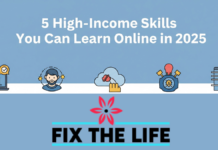Making a career change after 30 can feel risky—but it’s also one of the smartest moves you can make when your job no longer aligns with your goals, values, or lifestyle. Whether you’re seeking better work-life balance, more meaning, or simply a new challenge, your 30s are a great time to pivot. You’re experienced, self-aware, and capable of making decisions with long-term impact.
Here are some of the most promising and realistic job ideas for a successful midlife career switch in your 30s—and how to make the leap with confidence.
Why Consider a Career Change After 30?
By 30, many professionals have enough work experience to know what they don’t want—but not always a clear path toward what they do want. This is often the decade of realignment. Changing careers now means you’re still early enough to start fresh while bringing valuable skills from past roles.
Benefits include:
- Increased job satisfaction
- Better income potential
- Improved work-life balance
- Aligning work with passion or purpose
1. Tech & IT Roles (No Computer Science Degree Required)
Why it’s great: Tech continues to explode with opportunity, and many roles don’t require a formal degree. Think coding bootcamps, online certifications, and self-paced learning.
Career options:
- Web Developer
- UX/UI Designer
- Data Analyst
- IT Support Specialist
Real-world tip: Platforms like Coursera or Codecademy can get you job-ready in under a year.
2. Digital Marketing
Why it’s great: Every business needs marketing, and digital channels dominate. It’s a field that rewards creativity and analytical thinking.
Job ideas:
- Social Media Manager
- SEO Specialist
- Content Strategist
- Email Marketing Coordinator
Perk: Many roles are remote or freelance-friendly, offering location flexibility.
3. Healthcare (Without Becoming a Doctor)
Why it’s great: The healthcare field is stable, in-demand, and deeply rewarding. There are many non-physician roles that allow for patient interaction or backend support.
Job ideas:
- Medical Assistant
- Health Information Technician
- Occupational Therapy Assistant
- Mental Health Coach
Fast track tip: Many programs are available in 12–24 months, and some offer part-time paths.
4. Skilled Trades & Hands-On Professions
Why it’s great: These careers are often overlooked but offer strong pay, job security, and satisfaction—especially if you enjoy working with your hands.
Job ideas:
- Electrician
- Plumber
- HVAC Technician
- Automotive Technician
Bonus: Apprenticeships let you earn while you learn.
5. Project Management
Why it’s great: If you’re organized, good with people, and have leadership skills, project management is a natural fit. Many industries—from construction to tech—need these roles.
Entry route: Certification like PMP or CAPM boosts credibility quickly.
6. Education & Coaching
Why it’s great: Sharing knowledge can be incredibly fulfilling. Teaching and coaching roles allow you to inspire others while staying intellectually engaged.
Job ideas:
- K–12 Teacher (via alternative certification)
- Online Course Creator
- Career Coach
- Corporate Trainer
Online edge: Platforms like Teachable and Skillshare let you monetize your knowledge.
7. Entrepreneurship or Freelancing
Why it’s great: Tired of office life? Starting your own business gives you creative control and unlimited potential—though it comes with risk.
Ideas to explore:
- Freelance writing/design
- Consulting
- E-commerce store
- Personal brand or YouTube channel
Advice: Start as a side hustle to test the waters before diving in full-time.
8. Real Estate & Property Management
Why it’s great: If you’re social and good at negotiation, this field can be lucrative and flexible.
Job ideas:
- Real Estate Agent
- Property Manager
- Leasing Consultant
Note: Getting licensed typically takes just a few months.
9. Human Resources
Why it’s great: HR professionals shape workplace culture and help people thrive. It’s ideal if you enjoy problem-solving and people management.
Job roles:
- HR Generalist
- Talent Acquisition Specialist
- Learning & Development Coordinator
Upgrade path: SHRM or PHR certifications can open doors.
10. Creative & Design Careers
Why it’s great: If you’ve got a creative streak, consider turning your talent into income. Many of these roles are freelance-friendly or project-based.
Job ideas:
- Graphic Designer
- Video Editor
- Illustrator
- Interior Designer
Getting started: Build a portfolio on platforms like Behance or Dribbble.
Recommendation
Best Career Change Ideas for a Fresh Start After 30
Microshading Eyebrows- Everything You Need To Know
How To Get Rid Of A Double Chin?
Best Nail Art Designs for Girls This Season
Final Thoughts
Changing careers after 30 isn’t a step backward—it’s a strategic decision toward a more aligned and satisfying future. The key is to assess your transferable skills, embrace lifelong learning, and take calculated steps toward your goal. With so many resources and flexible job paths available today, a midlife career switch is not only possible—it’s practical.
FAQs
Q: Is it too late to change careers at 30 or 35?
A: Not at all. Many people switch careers in their 30s, 40s, or beyond and find greater satisfaction. You’re still early in your working life.
Q: Do I need to go back to college for a new career?
A: Not always. Many careers now offer certification programs, bootcamps, or on-the-job training that are faster and more affordable than a degree.
Q: How can I decide which new career path to pursue?
A: Start by identifying what you enjoy doing, your core skills, and what kind of lifestyle you want. Online assessments and informational interviews can help.
Q: Can I change careers without losing income?
A: Yes, especially if you move into high-demand fields like tech, project management, or healthcare. Starting as a side gig can also ease the financial transition.
Q: How long does a career transition typically take?
A: It depends on the field. Some changes can happen in a few months with the right training; others may take a year or more. Planning and consistency are key.




